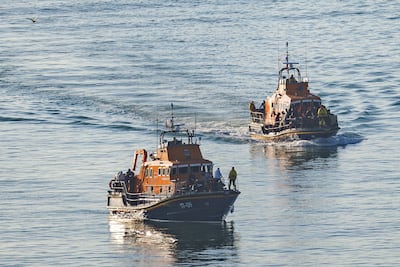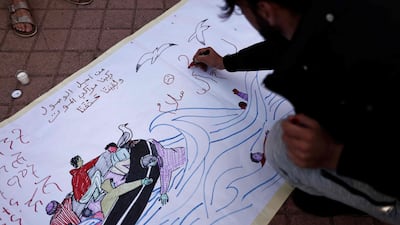Politics is a funny business. Bold leaders make political weather. Others are tossed around by the storm of daily problems and try to get through without drowning. That latter problem applies to the British Prime Minister Rishi Sunak. He is increasingly storm tossed. That’s because he seems to focus less on delivering policies than on the production of announcements to set the news agenda for a few compliant newspapers in the UK.
All political leaders do this to an extent, calling it "news management" or "strategic communications" – "comms" in the jargon. But this becomes a problem when underneath the words and promises there is a policy vacuum. Even Conservative-supporting newspapers seem to understand that the Sunak government’s "comms" are almost unbelievably terrible.
The most obvious example is Mr Sunak trumpeting government policies over asylum seekers crossing to the UK from France. Commentators, egged on by government comms experts and sometimes anonymous "sources", described the past week as "Stop The Boats Week".

We were informed that Mr Sunak’s team would probably offer a news-making announcement every day. But the result has been cack-handed because senior politicians managed to stoke up anger about a very significant problem and simultaneously reveal they haven’t a clue how to solve it.
For example, Lee Anderson, the deputy chairman of the Conservative party, has a particular flair for making news, but not always in a good way. He issued a foul-mouthed tirade against asylum seekers, telling them to go back to France, but using words so offensive I won’t repeat them here.
The real problem – which he did not mention – is that since the UK left the EU, a politician shouting “go back to France” is simply hot air. It is no longer realistically an option in most cases. Scrambling for better ideas, the government instead warned those it classes as “illegal” migrants that they will be sent to Rwanda.
After a series of legal challenges, that hasn’t happened. More hollow words followed about “lefty lawyers” scuppering government policy, by appealing to… well, to the law and judges who tend not to be notoriously left wing.
Then, an old (and generally considered daft) idea about sending migrants to Ascension Island was briefed to newspapers. Ascension is an arid and barely inhabitable lump of rock in the middle of the Atlantic, home to a military communications base and nothing much more.
Once more, an impossible solution to an intractable problem was briefed out by sources apparently close to the government. Back in the real world, recent figures suggest 50,546 asylum seekers are currently housed "temporarily" in British hotels. They are not allowed to work. They, therefore, cost the taxpayer around £6 million ($7.6 million) a day.
And so, rather than employing them to earn their keep, the government comms team announced that 500 male asylum seekers would be housed on a floating barge called the Bibby Stockholm, moored in Dorset on the English south coast. It’s been described as being like a prison ship.
Last week, 39 men were put on board – and then were almost immediately removed because legionella bacteria were found in the water supply. Legionella can cause serious, even fatal, lung problems including pneumonia.
Any fair-minded person understands that human trafficking gangs bringing desperate people across 40 kilometres of open water have to be stopped. Six people died last week on that journey, on a day when 509 people crossed in 10 boats. But this is a demand problem, not a supply problem.
Approximately 16,600 have made the journey this year, taking the total over five years to 100,000. It is, therefore, astounding that the British government comms team thought it was a good idea to announce "Stop The Boats Week" in August. Anyone not stuck in a government office must surely know that this is what we call "summer", when seas are typically calm, weather mild and, therefore, more boats would try their luck.
The predictable result is that the headline figure of 100,000 migrants has been reached, so why draw attention to a policy that was fated spectacularly and publicly to fail? The Home Secretary and mastermind, if that’s the correct word, of the Stop The Boats policy is Suella Braverman.
Calls for her resignation are repeated almost daily. But Mr Sunak may decide that Ms Braverman may fail repeatedly but at least she remains a successful human shield to protect the Prime Minister from blame.
Two facts, however, still matter. First, drought, war and repression in the Sahel, in Afghanistan and other poor countries mean the traffic in desperate humans seeking a better life in Europe cannot be solved by any country acting alone.
Second, blaming asylum seekers and inventing ideas of resettling migrants in Africa or on remote islands makes politicians sound desperate and silly.
International problems require international solutions. That involves law enforcement cracking down on trafficking, coupled with fair systems to legalise migration, and ultimately understanding the problem. Those risking everything at sea want a better, safer life for themselves and their children – precisely what you want and I want. If that is denied in your homeland, what would you do?


